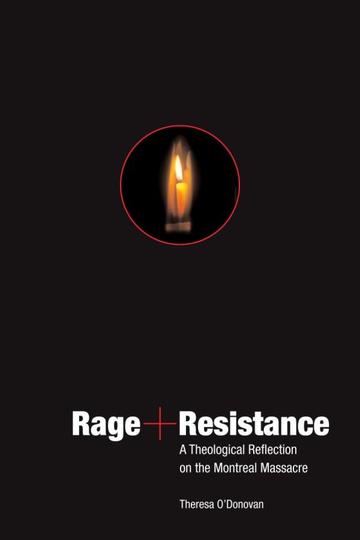On December 6, 1989, a man armed with a semi-automatic rifle entered an engineering school in Montreal and murdered fourteen women before killing himself. Responses to what has come to be known as “The Montreal Massacre” varied, from the initial shock and mourning and efforts to “make sense” of the tragedy to an outpouring of writing, art, conferences, and political lobbying. Rage and Resistance: A Theological Reflection on the Montreal Massacre examines, from a theological perspective, how the massacre was “taken up” by the media, experts, politicians, and a variety of individuals and groups.
A practical exercise in Canadian contextual theology, Rage and Resistance analyzes responses to a tragic historical event by engaging with the work of theologian Gregory Baum and sociologist Dorothy Smith. Baum articulates the theological imperative to address the context in which our lives are embedded, calling for critical social analysis in order to understand, and possibly convert, social evil; Smith takes the standpoint of women as a determinate position from which society may be known.
If one of the tasks of theology is to articulate and clarify the struggles in which we are engaged—to name our reality, both the forces that oppress and the possibilities for resistance and healing—this book takes on that task by focusing on an event indelibly etched into the minds of many Canadians. It analyzes some of the artistic, memorializing, and activist responses as manifestations of a spirituality of resistance and urges ever greater resistance to violence against women.
Theresa O’Donovan is an associate professor in the Department of Religious Studies and Philosophy at Brescia University College in London, Ontario. Experiences teaching in Sierra Leone and Nicaragua provided the impetus that led her to theological studies. Her interests include issues of violence against women, contextual theologies, and politically oriented spiritualities.
O'Donovan's is a rare achievement, an artful integration of theological acumen, social analytics, and political relevance. She relies on 'the stubborn particulars of grace' to face the ugliness of hate and violence against women in the 1989 Montreal Massacre and to make meaning for transforming Canadian landscapes. Rage and Resistance is a powerful and elegant narrative--a 'writing against forgetting' and for empowerment to change the world. It calls out, 'Let's take courage together'!
O'Donovan's work offers a refreshing perspective on a difficult topic. I highly recommend this book to anyone in the fields of gender studies and theology.
''I was surprised by the opening to the appendix of this book: “Here is an invitation” (107). Upon reading the invitation...I realized how this reflection effectively works not to give a final summation of its topic. Her book would be as good company in a methodologically-focussed interdisciplinary studies course as in a pastoral theology seminar. Students would have no problems finding something to write about. Individual readers will likely discover renewed passion for their own work too.''
O'Donovan's book expresses the qualities of her 'spirituality of resistance.' It is a trenchant, detailed analysis of an event that shocked Canadians, but that in her view risks premature closure.... Her constructive theological approach would be of particular interest to anyone working on a fruitful dialogue between sociology and theology, as well as anyone seeking to expand theological categories to include violence.... O'Donovan has given us a dynamic and courageous book.
''O'Donovan's work offers a refreshing perspective on a difficult topic. I highly recommend this book to anyone in the fields of gender studies and theology.''



